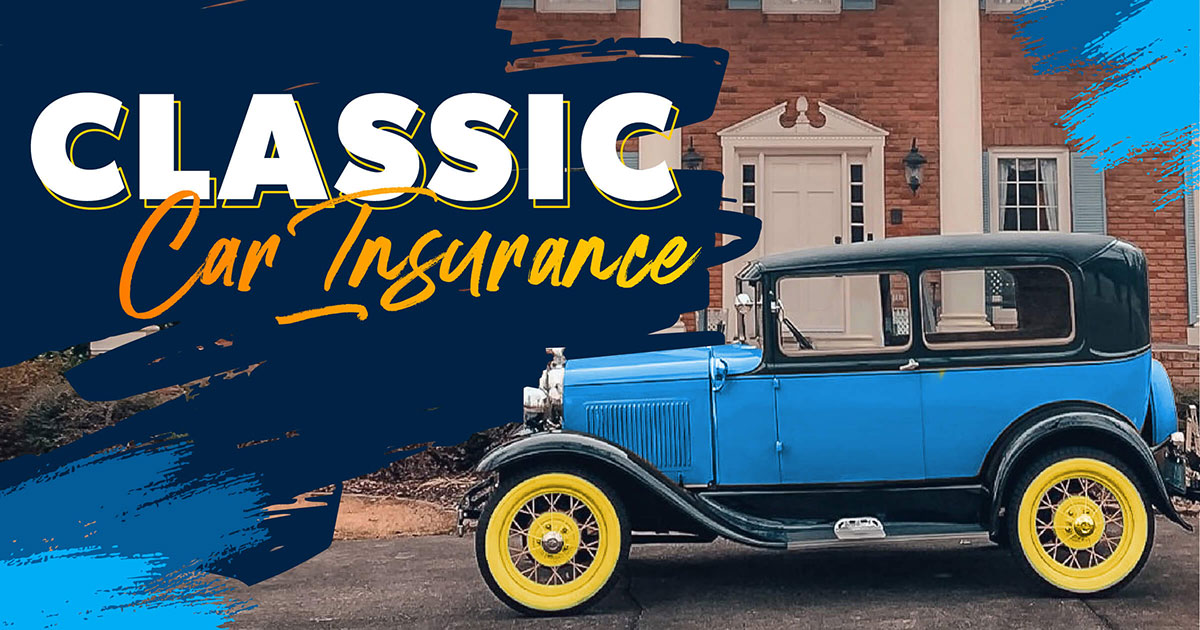What Is Classic Car Insurance and Do I Need It?
10 Min Read | May 1, 2025

Whether you’re running down the road in serious ‘70s muscle or tooling around town in a sweet Model A like this one, your classic car is a work of art.
And that’s why it should never roll out of your garage without the proper protection . . . classic car insurance! This special type of insurance protects you from financial loss if your classic is involved in an accident—and it’s necessary for anyone driving a collector car!
So, let’s take a look under the hood to see what classic car insurance is and how it helps you.
What Is Classic Car Insurance?
Classic car insurance (also known as antique or vintage car insurance) is special insurance for collector vehicles. It typically has lower premiums than regular car insurance (yay!) and it helps protect you financially if something bad happens to your classic.
So, what counts as a classic car?
Home and auto insurance aren’t just about low rates—they’re about the right coverage level. Talk to a trusted pro who can help you get both.
That depends who you ask. Insurance companies, state motor vehicle departments and auto enthusiasts’ clubs all have their own rules about what counts as a “classic.” And as you may have guessed, those rules vary!
Here’s what they do agree on:
Classic cars are old.
You may be thinking, Well, duh! Here’s where it gets a little tricky, though.
Even though cars are usually grouped by age, not all insurers, states or auto clubs agree on the age cutoff. To make things even more complicated, some people use the words classic, antique and vintage to mean the same thing . . . and others don’t.
We know—it’s confusing! So here’s the breakdown:
In general, if your vehicle is over 25 years old, you can safely call it a classic, and you can get classic car insurance. An antique car is typically 45 or older. And vintage cars are the oldest—in that case, you’re looking at cars that were made before the Great Depression.
You can register most classic, antique or vintage cars as historical vehicles with your state’s Department of Motor Vehicles (DMV). That’ll get you special license plates and possibly cheaper registration fees. Just double-check your state’s rules to make sure your vehicle qualifies.
Classic cars have special uses.
These aren’t your daily drivers. They’re leisure cars! You know, the cars you drive when you take your spouse for a cruise down memory lane or take the grandkids to get ice cream.
Many owners also use their classic vehicles at fun events regular cars don’t normally participate in—like car shows, parades, exhibitions and special tours.
Classic cars are valuable.
Unlike most cars, classics hold their value—or even increase in value—as they age. For example, a brand-new Dodge Charger Daytona cost less than $5,000 in 1969. That same car is worth almost $100,000 in poor condition now. (A fully restored model went for $900,000 in 2015.) 1,2
Some cars are also more valuable if they were produced in very limited numbers (such as the 1963 Chevy Impala Z11—less than 100 were built) or if they were made by a company that’s since gone under (like Studebaker or Plymouth).3
Basically, the rarest cars are the most valuable—and the ones that need classic car insurance the most.
Classic cars may not be classics . . . or cars!
Now that we’ve defined a classic car, we want to add one little caveat: You may need classic car insurance even if your vehicle is “too young” or it’s not a car. Here are some other vehicles that need this insurance:
- Classic or antique trucks, like a 1953 Ford F100
- Motorcycles, tractors and other vehicles that are at least 25 years old
- Veteran vehicles that were used for the military, like a Willys MA Jeep or an Indian Model 841 motorcycle
- Modern muscle cars, limited production models or specialty vehicles
- Exotic cars, like an Aston Martin Valkyrie or a Bugatti Chiron Super Sport
- Kit cars that look like a classic, even though they’re not actually that old
Basically, classic car insurance isn’t limited to just old cars—or even to cars, period. It’s more important that your vehicle is valuable and used for special purposes, not just driving to work or the grocery store.
Does Your Vehicle Qualify for Classic Car Insurance?
Besides being old, valuable and for special use, your collector vehicle has to meet some other criteria to be eligible for classic car insurance.
Limited Driving
Your daily driver might be ancient, but it doesn’t qualify for classic car insurance. True classic or antique car insurance only covers vehicles that you drive occasionally for pleasure or special events like car shows or parades.
Some insurers are such sticklers about this, they even put mileage restrictions on your car (yuck!). Make sure you know about any restrictions: If your insurer’s mileage limit is crazy low, it might be time to find a new insurance company.
"Good” Condition
That old hunk-a-junk you pulled out of your grandpa’s barn? It might qualify for classic car insurance . . . or it might not.
Some insurers will only cover your car if you fully restore it or are in the process of restoring it. Others will insure your classic as long as it’s in good working condition—which is great if you’re more worried about getting your car running than making it look nice.
There is one possible monkey wrench though: Some insurance companies only offer classic car insurance if you’re doing a stock restoration (which means making the car look like new, using the same types of parts originally available for that model year). So if you want to customize your ride, check with your insurer to see how that will affect your coverage.
Storage
After buying or restoring a collector car, most owners want to keep it indoors. Letting it sit outside is a big risk—and some insurance companies think so too. That’s why they won’t sell you classic car insurance unless you keep your vehicle in an enclosed garage, shed or storage unit. (Bonus points if the building is locked.)
But don’t worry—if you don’t have an enclosed storage space, you can still find a handful of insurers who will let you keep your car in a carport or even the driveway. Just know that it might affect your rates.
How Is Classic Car Insurance Different Than Standard Car Insurance?
The short answer is classic car insurance gives you more coverage than standard car insurance. Here are the main differences:
How Classic Car Insurance Works
Your classic car is a lot more valuable than your daily driver. Plus, it’s not like many factories make spare parts for vintage vehicles. Classic cars cost way more to repair or restore if they’re damaged.
Classics also have different uses than regular cars—and different insurance risks. Simply put, trying to apply standard car insurance to a one-of-a-kind vehicle is like trying to fit a square peg into a round hole. It just doesn’t work.
So rather than give you some cookie cutter insurance, you and your insurer will set an agreed value, or how much your vehicle is worth. That amount (minus your deductible) is what the insurance company will cover if you’re involved in an accident.
So let’s say you own a 1950 Oldsmobile 88. You and your insurer set an agreed value of $35,000, and you chose a $1,000 deductible. If your Olds got totaled (which we hope never happens), you’d pay the first $1,000 toward the repairs. Your insurer would pay the other $34,000.
The key is to pick the right agreed value—even if it means paying a higher monthly premium. If you agree to a value that’s too low and something happens to your car, you’ll be up the creek without a paddle.
Increasing Coverage
As a regular car gets older, its value goes down, so you can also decrease your coverage. Classic cars are the exact opposite. The older your car gets, the more valuable it is, and the more coverage you need. Check your collector car insurance policy regularly to make sure your agreed value is still what your car is actually worth.
Benefits and Limitations of Classic Car Insurance
We’ll be honest: When it comes to insuring classic vehicles, there are a lot of rules. Some insurers won’t let you list teen or young adult drivers on your policy. (To be fair, do you really want your teen driving your priceless 1965 Corvette unsupervised? We didn’t think so.)
The good news is classic car insurance comes with some additional coverages and protective measures that you can’t get on a standard policy.
What Types of Coverage Can You Get With Classic Car Insurance?
Most types of car insurance are also available for classics, but there are some differences. Let’s take a look at what’s the same, and then we’ll get into those differences next.
Just like any car, your classic needs plenty of liability insurance to make sure your butt is covered if you cause any property or personal damage in an accident. You also need comprehensive and collision coverage to help pay to repair or replace your car if something bad happens.
But there are other coverages especially for collector cars, like:
- Traveling coverage – pays for expenses if you break down on a trip
- Auto show medical reimbursement – pays if someone gets hurt in or near your car at a show
- No-attendance coverage – pays costs at auto events even if you’re not around your car when the incident happens
- Spare parts coverage – helps pay for replacement parts, which can be costly or hard to find on your own
- Towing insurance – because, let’s be real, sometimes you find out what part of the restoration didn’t work when you’re stranded on the side of the road
Here’s some more food for thought: If you have a classic car and a high net worth (over $1 million), it’s worth buying an umbrella insurance policy to protect you from crazy lawsuits and gold diggers.
How Much Does Classic Car Insurance Cost?
As with all car insurance, it depends. (We know, we know.) There are lots of factors that affect your rates—or your ability to get coverage in the first place.
Your car’s age, condition and your driving record are three of the biggest influencers on how much your insurance will cost. So if you want the best rates, drive safely and follow the rules of the road! (We won’t blame you if you squeal the tires a little when no one’s watching though.)
The good news is that classic car premiums are almost always cheaper than standard car insurance, because classics spend less time on the road and are therefore less likely to get wrecked. And there are plenty of ways to save money on your policy, like joining a classic car club to get a discount.
But here’s the thing: You don’t want to cut corners, because you’re not insuring some fresh-off-the-line commuter sedan here. You’re insuring a one-of-a-kind vehicle. You need to go into full-on Goldilocks here and get classic car insurance that’s juuuuust right.
And to do that, you’ll need to work with just the right agent. Our network of RamseyTrusted® insurance pros are top-notch car insurance experts. Even better, they’re independent agents—so they’ll shop around with multiple insurers and get you the best quotes for your vehicle. And hey, if you've got any other nontraditional vehicles, they can help with coverage for those too.
Connect with a pro in your area today!



